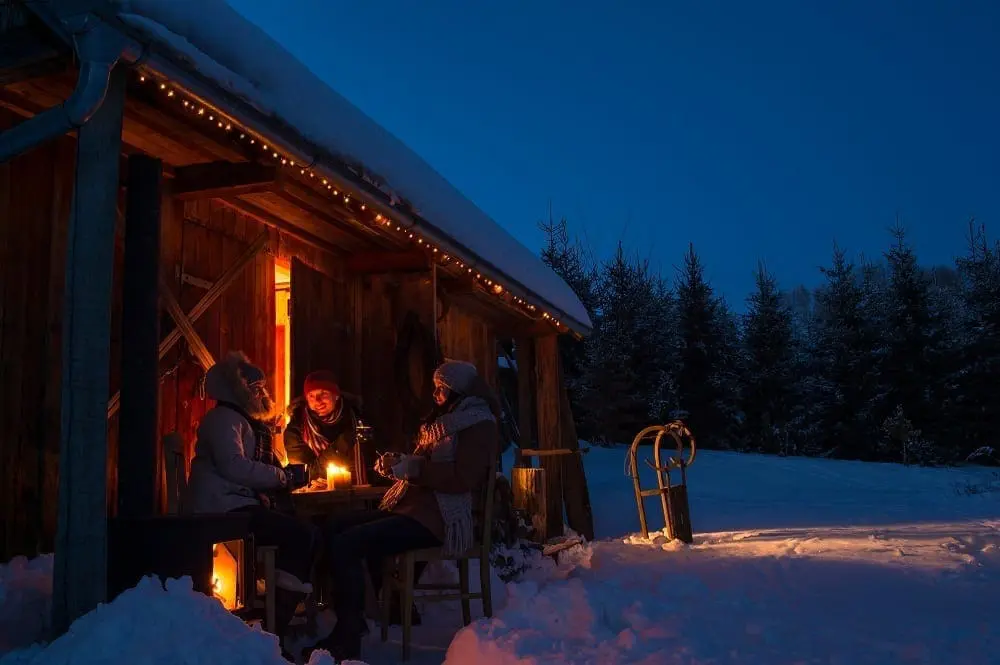When I arrive on my Aunt’s doorstep in Germany, she greets me with “Kommt ‘rein… mach’s euch Gemütlich!”(come in, make yourself gemütlich) and on family evenings instead of making plans my mother might say, “Wir machen uns Heute Abend Gemütlich” (tonight we will make ourselves gemütlich). A small well appointed room is described as “Gemuetlich”, and a noisy drafty restaurant would be called un-gemütlich. (I once sat next to a woman in a soccer stadium who complained that the wall behind our seats made it very un-gemütlich!) Gemütlich or Gemütlichkeit is one of those easy to understand, yet impossible to define German words. It’s a word that describes a feeling, rather than something absolutely tangible. A word Germans instinctively understand. So, what is Gemuetlichkeit? How did it become such a central part of German life?
What is Gemuetlichkeit?
Gemütlichkeit translates loosely to describe “the state or feeling of warmth, friendliness or good cheer”. This term often gets associated with the feelings you have sharing a beer with friends at a beer garden or exploring a Christmas market with your family. Some see the English equivalent being “cozy”, yet to Germans this misses a key component. To them, Gemütlichkeit has a good, warm feeling that comes from interactions with others. It grows from a sense of close community or belonging, and touches on senses of full well-being.

Gemutlichkeit Defined
German can be a fairly straightforward language. Words get put together to create a name that might be descriptive to explain the new concept.
Think about the world Schlafsack. Translated literally it means Sleep bag (schlaf- sleep, sack- bag). Perfect. Literal, straightforward.
But a word like Gemüt isn’t so straightforward. Gemüt is defined a number of ways… as mind, mood, feeling, and psyche. A state of mental being.
Add “lich” and you turn the noun into an adjective. Lich describes the Gemüt. (No, there’s no exam, and the Grammar police are not on their way).
So now we add “keit”, which turns the adjective back into a noun. (and no, you aren’t the only one a little confused)
What is Gemeutlichkeit? Gemuetlichkeit is when your mental state is at peace, and entirely content in its current state.
A History of Gemütlichkeit
Perhaps the word is better understood if you know a bit of the history. (And don’t worry, I won’t dig too deep.)
The concept of Gemütlichkeit emerged during the Biedermeier period in German history. This time between the Napoleonic war ended in 1815 and the Revolutionary wars kicked up in 1848 were a time of Middle-Class prosperity. A time of looking inward to hearth and home. But why?
It was all because of industrialization. Factories and industry were creating wealth in Germany, and the Urban Middle-Class grew. The people were war weary, and after years of political oppression, they decided to use their extra time and money to focus on domestic issues instead of politics. It was as if an entire group of people collectively said… “I have food in my stomach, a roof over my head, I’m sick to death of politics, so I’m staying home with my family and just enjoying my life”.
Ironically, the word Biedermaier comes from a pair of satirical poems by Joseph von Scheffel called “Biedermanns Abendgemütlichkeit” and B”ummelmaiers Klage” about the withdrawal from public political life. Bieder means “unadventurous” and Maier is like Smith…. A Biedermeier is an unadventurous average man. But that takes us away from the main point.
The Biedermeier period even comes with its own design style… simple, functional, practical. More people bought and read books, people took up hobbies, homes had pianos, and every house had a writing desk.
This was a time of the idyllic lifestyle. The husband went to work, while the wife stayed home and made sure that the home was comfortable for the family. Home Sweet Home. The word Gemütlichkeit comes from this, the idea of withdrawing from the outside world, and focusing on the domestic.

What is Gemuetlichkeit Today
While today’s lifestyle may have changed a bit, the German desire for Gemütlichkeit remains. The in-home feeling of sanctuary, of belonging. Perhaps that is why, from the outside Germans may look a bit distant, but at home, Germans are the warmest people I know. It’s all about Gemütlichkeit.
I think we can all agree that the world could use more Gemütlichkeit.

Please consider removing the protections on your page that disable printing, etc. I teach German and would love to share your content in my lessons, but the protections you have in place make it so much more time consuming to try and integrate it into my lessons. 🙁
I have protections because my content was being stolen. If you need something for a class, send me an email.
Hello everyone. When my middle sister with husband came to visit me here in the States, I was over the moon about it. Had not seen any of my family in over 20 years. When I seen her exiting the plane in Dallas, I was thunder struck. She looked a lot like my mother. We flew in to each others arms, cried, hugged, kisses all over. I will never forget that moment. Even my husband had tears in his eyes. I seldom seen that of him. We all drove to my home in Abilene, TX. It was about a 4 hour drive. We talked so much and kept touching each other. She didn’t speak English, so I had to translate every word to my husband. The next day, I was so hoarse, could barely crock out one word. She loved my house. That evening we all sat down to a Gemuetlich Abend. She wanted to know what Gemuetlich meant in English. I had one heck of a time trying to find the right words. But she understood what I meant. We had a wonderful Gemuetlich Abend. It felled like heaven to me. Both, my sister and her husband fell in love with Texas. They bought a piece of land right across from me. They never got to come here to live. She died a horrible death in Germany. My Brother-in-law called me and I heard her screaming over the phone. I could barely handle it. Her doctor gave her one more pain shot and knew her heart could not handle more. She died. I thanked the doctor for giving her that last shot. She had to get pain shots every few minutes. Her pain was that severe. They both came here almost every year. I got to seen them at least 6 times, before she died. I pray every night to God not to let me die like my sister. May she rest now in our Lords arm.